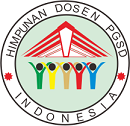Focus and Scope
School Education Journal PGSD FIP UNIMED publishes the result of literature studies as well as research result in the scope of education in general and basic education in particular. The study cover education and learning in basic education, the studies of five areas of elementary school namely Mathematics, Indonesian Language, Science, Social Studies, and Civics and additional fields such as English, Art and Sports in basic education includes the study of local content studied in the scope of basic education.
Section Policies
Articles
Peer Review Process
The article submitted to this online journal will be peer-reviewed at least 2 (two) reviewers. The accepted articles will be available online following the journal peer-reviewing process. Language used in this journal is English or Indonesia. An editor first reviews the submitted manuscript. Next, the office will evaluate whether it suits our focus and scope or has a major methodological flaw. Every submitted manuscript which passes this step will be checked to identify any plagiarism before being reviewed. This journal uses a double-blind review. Reviewers' comments are also sent anonymously to the corresponding author to take the necessary actions and responses. Finally, the revised manuscript's decision will be evaluated in an editorial board meeting, based on the reviewer's recommendation from several possibilities: rejected, require major revision, need minor revision, or accepted. The Editor-in-Chief of School Education Journal PGSD FIP UNIMED has the right to decide which manuscripts submitted to the journal should be published.
Open Access Policy
This journal provides immediate open access to its content on the principle that making research freely available to the public supports a greater global exchange of knowledge.
Archiving
This journal utilizes the LOCKSS system to create a distributed archiving system among participating libraries and permits those libraries to create permanent archives of the journal for purposes of preservation and restoration. More...










.png)
